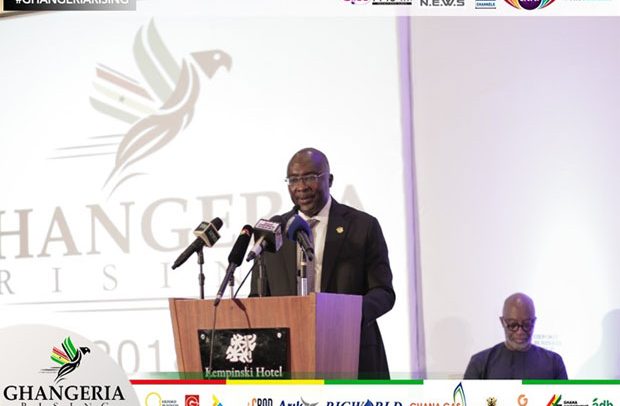Vice President Dr Mahamadu Bawumia
Vice President Dr Mahamadu Bawumia says Ghana remains open to legitimate businesses from Nigeria.
Speaking at the launch of this year’s Ghangeria Rising, an annual high-level event that seeks to bring together key investors, businessmen and women, policy-makers and regulators from Ghana and Nigeria on Thursday in Accra, Dr Bawumia said: “Nigeria will remain an important country and friend of Ghana.”
According to him, President Akufo Addo’s administration would work to ensure Nigerian-owned businesses grow and thrive in Ghana.
In line with this, he called for the building and strengthening of platforms between the private sector and governments of both countries.
He said the implementation of the paperless system has significantly reduced transaction time and increased revenue at the ports, adding that the government is also addressing challenges in the financial sector to promote strong private sector credit growth.
“We are engaged in a major digitization agenda for the Ghanaian economy, which is going to leverage technology…We are working continuously to improve our taxation policy, free additional working capital for businesses and provide relief for consumers. We have introduced significant improvement in the clearing of goods at the ports and improve the efficiency with the introduction of freight scanners transaction system at the ports.
“We are hoping to expand opportunities for inclusive growth and create jobs, improve livelihoods and reduce poverty.”
Sub-regional challenge
Dr Bawumia also called on other African countries, especially those in the West African sub-region, to leverage the use of their resources for growth, as well as increase their competitiveness in the ECOWAS sub-region.
“There’s no reason why Ghana, Nigeria and Guinea, for example, cannot cooperate fully to develop an integrated aluminum industry, using energy from Nigeria to drive processing of bauxite from Guinea and Ghana and to use the alumina to feed Ghana’s aluminum smelter,” Dr Bawumia said.
Ghana and Nigeria are the two largest economies in ECOWAS, the 16-country economic bloc of the West African region.
The two countries account for nearly 60 percent of the ECOWAS region’s population and more than 85 percent of its GDP over the year.
By Samuel Boadi


